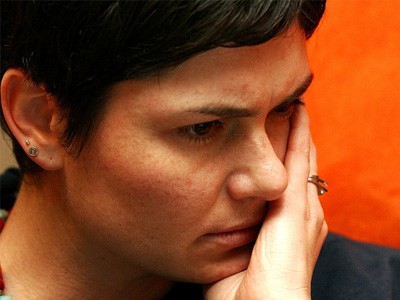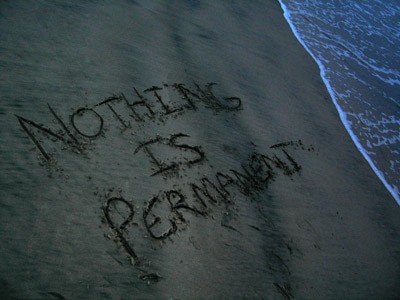Ruminating

We have a precious human life with the potential to develop love, compassion, and wisdom limitlessly. How do we use that potential? What occupies our mind most of the time? When observing my mind, I see that much time is spent ruminating about the past and the future. Thoughts and emotions twirl around, seemingly of their own accord, but I must admit to sometimes churning them up or at least not making the effort to counteract them. Are you similar? What do we ruminate about and what effect does it have on our life?
The past
One big topic of rumination is past hurts. “I was so hurt when my spouse said xyz.” “I worked so hard for the company but they didn’t appreciate me.” “My parents criticized the way I look,” and on and on. We have an excellent memory for all the times others have disturbed or disappointed us and can dwell upon these hurts for hours, reliving painful situations again and again in our minds. What is the result? We get stuck in self-pity and depression.
Another topic is past anger. We repeatedly go over who said what in a quarrel, analyzing its every detail, getting more and more agitated the longer we contemplate it. When we sit to meditate, concentrating on the object of meditation is difficult. But when we reflect on an argument, our concentration is great! In fact, we can sit in perfect meditation posture, looking very peaceful externally, but burning with anger inside as we single-pointedly remember past situations without getting distracted for even a minute. When the meditation bell rings at the end of the session, we open our eyes and discover that the event we spent the last half hour contemplating is not happening here and now. In fact, we’re in a safe place with nice people. What is the effect of ruminating on anger? Clearly, it’s more anger and unhappiness.
When we ruminate on feelings of being misunderstood, it is as if we were chanting a mantra, “My friend doesn’t understand me. My friend doesn’t understand me.” We convince ourselves of this; the feeling becomes solid, and the situation looks hopeless. The result? We feel alienated, and we unnecessarily back away from those we want to be close to because we’re convinced they never will understand us. Or we may spill our neediness over the other person in an attempt to make them understand us in the way we want to be understood.
All our ruminations aren’t unpleasant, though. We can also spend hours recalling past pleasurable events. “I remember lying on the beach with this wonderful guy who adored me,” and off we go on a fantastic fantasy. “It was so wonderful when I won that reward and received the promotion I wanted,” and the real life situation appears like a movie to our conceptual mind. “I was so athletic and healthy. I could throw a ball like no one else and catch the ones no one else could,” and happy memories of past victorious sports events glide through our mind. The result? We feel the tinges of nostalgia for the past which is long-gone. Or, dissatisfied and anxious, we seek to re-create these events in the future, which leads to frustration because circumstances have changed.
Meditators are no exception to this. We hold onto a wonderful feeling in meditation and try to re-create it in future sessions. Meanwhile, it eludes us. We remember a state of profound understanding and feel despair because it hasn’t happened since. Accepting an experience without getting attached to it is hard for us. We cling to spiritual experiences in the same way we used to grasp at worldly ones.
The future
We also spend lots of time ruminating about the future. We may plan things for hours. “First I’ll do this errand, then that, finally the third. Or would it be quicker to do them in the reverse order? Or maybe I should do them on different days?” Back and forth our mind swings trying to decide what to do. “I’ll go to this college, do graduate work at that one, and then send out my resume to land the job I’ve always wanted.” Or, for Dharma practitioners, while doing one retreat, we daydream about all the other practice opportunities that lie before us. “This teacher is leading a retreat in the mountains. I can go there and learn this profound practice. With that under my belt, I’ll go to this other retreat center and do a long retreat. When that is done, I’ll be ready for a private hermitage.” No practice gets done now because we’re too busy planning all the wonderful teachings we’re going to receive and retreats we’re going to do in the future.
Envisioning the future, we create idealistic dreams. “The Right Man/Woman will appear. S/He’ll understand me perfectly and then I’ll feel whole.” “This job will fulfill me completely. I’ll quickly succeed and be nationally recognized as excellent in my field.” “I’ll realize bodhicitta and emptiness and then become a great Dharma teacher with so many disciples who adore me.” The result? Our attachment runs wild, and we develop unrealistic expectations that leave us disappointed with what is. In addition, we don’t create the causes to do the things we imagine because we’re stuck in our head just imagining them.
Our future ruminations may also spin around with worry. “What if my parents get sick?” “What if I lose my job?” “What if my child has problems at school?” In school, we may not have been very good at creative writing, but in our heads we dream up fantastic dramas and horror stories. This results in our stress level zooming sky high as we anxiously anticipate tragedies that usually do not occur.
Our worries may zoom outward about the state of world. “What happens if the economy plummets? If the ozone layer keeps increasing? If we have more anthrax attacks? If the terrorists take over the country? If we lose our civil liberties fighting the terrorists?” Here, too, our creative writing ability leads to fantastic scenarios that may or may not happen, but regardless, we manage to work ourselves into a state of unprecedented despair. This, in turn, often leads to raging anger at the powers that be or to apathy, simply thinking that since everything is rotten, there’s no use doing anything. In either case, we’re so gloomy that we neglect to act constructively in ways that remedy difficulties and create goodness.
The present
The only time we ever have to live is now. The only time that spiritual practice is done is now. If we’re going to cultivate love and compassion, it has to be in the present moment, because we don’t live in any other moment. So, even though the present is constantly changing, it’s all we have. Life happens now. Our past glories are simply that. Our past hurts are not happening now. Our future dreams are simply future dreams. The future tragedies we concoct do not exist at this time.
A spiritual practitioner may remember previous illuminating moments and dream of future exotic situations, replete with fully enlightened teachers and blissful insights, but in fact, practice occurs now. The person in front of our nose at this moment represents all sentient beings to us. If we’re going to work for the benefit of all sentient beings, we have to start with this one, this ordinary person in our everyday life. Opening our hearts to whomever is before us requires discipline and effort. Connecting with the person in front of us necessitates being fully present, not off in the past or the future.
Dharma practice means dealing with what is happening in our mind at this moment. Instead of dreaming of conquering future attachment, let’s deal with the craving we have right now. Rather than drown in fears of the future, let’s be aware of the fear occurring right now and investigate it.
Counteracting forces
H. H. the Dalai Lama speaks of counteracting forces for the disturbing emotions. These counteracting forces are specific mental states that we cultivate to oppose the ones that are not realistic or beneficial. Reflection on impermanence and death is an excellent opponent force for mental states that spin around with either worry or excitement. When we reflect on impermanence and our own mortality, our priorities become much clearer. Since we know that death is certain but its time isn’t, we realize that having a positive mental state in the present is of utmost importance. Worry can’t abide in a mind that is content with what we have, do, and are. Seeing that all things are transient, we stop craving and clinging onto them, thus our happy memories and enjoyable daydreams cease to be so compelling.
Recognizing past turmoils and future rhapsodies as projections of our mind prevents us from getting stuck in them. Just as the face in the mirror is not a real face, the objects of our memories and daydreams are likewise unreal. They are not happening now; they are simply mental images flickering in the mind.
Reflecting on the value of our precious human life also minimizes our habit of ruminating. Our wondrous potential becomes clear, and the rarity and value of the present opportunity shines forth. Who wants to ruminate about the past and future when we can do so much good and progress spiritually in the present?
One counteracting force that works well for me is realizing that all these ruminations star Me, Center of the Universe. All the stories, all the tragedies, comedies, and dramas all revolve around one person, who is clearly the most important one in all existence, Me. Just acknowledging the power of the mind to condense the universe into Me shows me the stupidity of my ruminations. There is a huge universe with countless sentient beings in it, each of them wanting happiness and not wanting suffering just as intensely as I do. Yet, my self-centered mind forgets them and focuses on Me. To boot, it doesn’t even really focus on Me, it spins around My past and future, neither of which exist now. Seeing this, my self-centeredness evaporates, as I simply cannot justify worrying about only myself with everything that is going on in the universe.
The most powerful counteracting force is the wisdom realizing there is no concrete Me to start with. Just who are all these thoughts spinning around? Who is having all these ruminations? When we search we cannot find a truly existent Me anywhere. Just as there is no concrete Me to be found on or in this carpet, there is no concrete Me to be found in this body and mind. Both are equally empty of a truly existent person who exists under her own power.
With this understanding, the mind relaxes. The ruminations cease, and with wisdom and compassion, the Me that exists by being merely labeled in dependence on the body and mind can spread joy in the world.
Venerable Thubten Chodron
Venerable Chodron emphasizes the practical application of Buddha’s teachings in our daily lives and is especially skilled at explaining them in ways easily understood and practiced by Westerners. She is well known for her warm, humorous, and lucid teachings. She was ordained as a Buddhist nun in 1977 by Kyabje Ling Rinpoche in Dharamsala, India, and in 1986 she received bhikshuni (full) ordination in Taiwan. Read her full bio.


